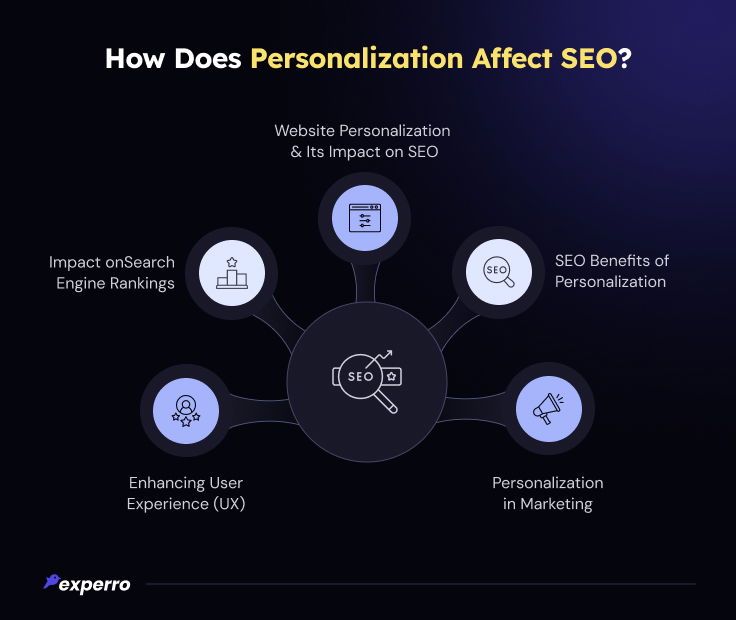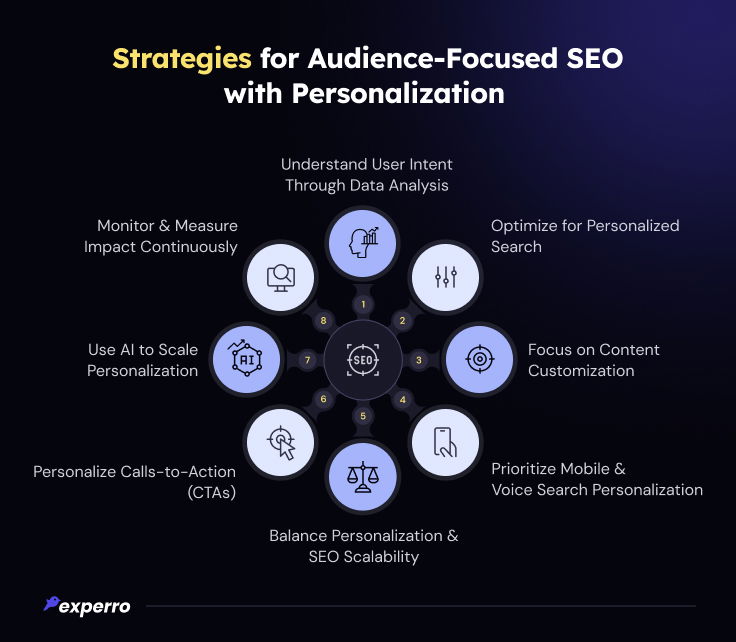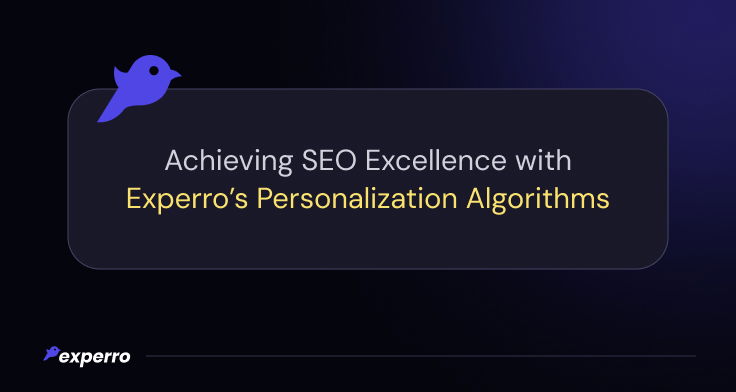How Does Personalization Affect SEO In Better Ranking & Traffic?

What’s Inside
- How Does Personalization Affect SEO?
- Does Site Engagement Affect SEO?
- How Can Personalization Shape Strategies for Audience-focused SEO?
- The Future of SEO: How Personalization is Reshaping It?
- Drive SEO Excellence Through Experro’s Transformative Personalization
- Conclusion
Key Takeaways
- Balancing website personalization and SEO scalability is crucial to overcome technical challenges and maintain visibility.
- Personalization enhances SEO by improving user engagement, reducing bounce rates, and boosting search engine rankings.
- Tailored content and personalized experiences drive higher organic traffic and better alignment with user intent.
- Experro’s personalized solutions optimize user journeys, ensuring SEO success and measurable business results.
How does personalization affect SEO?
How does it transform search rankings and engagement?
How does it help meet user intent more effectively?
In the world of search engine optimization (SEO), personalization has emerged as a game-changer. It goes beyond static, one-size-fits-all approaches to deliver tailored content, improving user satisfaction and engagement.
But how does personalization affect SEO, and why does it matter?
In this blog, we’ll explore the connection between SEO and personalization, the challenges and benefits of combining the two, and actionable strategies to create audience-focused SEO.
With personalized ranking in eCommerce search and the growing role of website personalization in marketing, the future of personalization and SEO is undeniably intertwined.
How Does Personalization Affect SEO?
eCommerce personalization has transformed SEO into a keyword-centric practice focused on user intent and behavior.

Here’s how personalization affects SEO:
1. Enhancing User Experience (UX)
Types of website personalization help improve UX by tailoring content, navigation, and recommendations to individual preferences.
This boosts metrics like user’s time spent on site, reducing bounce rates—both crucial signals for search engines.
2. Impact on Search Engine Rankings
Search results align better with user needs, leading to improved click-through rates (CTR).
Personalized product ranking in eCommerce search empowers businesses to enhance their visibility by tailoring results to meet individual queries.
3. Website Personalization and Its Impact on SEO
While beneficial, personalization can create technical challenges, such as ensuring Google indexes dynamic content correctly.
Businesses must address these SEO challenges of personalization to maintain visibility.
4. SEO Benefits of Personalization
By offering tailored content, personalization fosters trust and loyalty. These actions generate backlinks, social shares, and repeat traffic—which are also the key contributors to eCommerce SEO success.
5. Personalization in Marketing
With personalized approaches, marketers can optimize campaigns, driving higher engagement and conversions.
This seamlessly integrates with the eCommerce SEO checklist and customer experience, making it a win-win for businesses and users alike.
Does Site Engagement Affect SEO?
Absolutely yes. Search engines prioritize websites that demonstrate strong engagement signals.
Metrics like page views, dwell time, and session duration reflect user satisfaction and relevance.
Personalization at a scale plays a critical role here by presenting content that resonates, thereby boosting engagement. The effects of personalization on SEO are evident in higher organic rankings and traffic.
As personalization increases user engagement, it contributes to better SEO outcomes, and improved rankings drive more traffic.
How Can Personalization Shape Strategies for Audience-focused SEO?

1. Understand User Intent Through Data Analysis
Leverage analytics tools to gather user demographics, preferences, and on-site behavior data. You can segment your audience effectively by analyzing personalization trends like AI-driven real-time personalization, predictive analytics for customer intent, and hyper-personalized content.
Use this information to implement website personalization and SEO tactics that offer highly relevant experiences, like personalized landing pages or tailored product recommendations.
Over time, this approach enhances the eCommerce SEO benefits of personalization by aligning content with user intent.
2. Optimize for Personalized Search
Personalized search tailors search engine results based on individual preferences, location, and behavior.
Ensure your website supports dynamic content that search engines can crawl effectively. Add schema markup and dynamic meta tags to make personalized elements SEO-friendly.
This will enhance your visibility for personalized ranking in eCommerce search and queries, ensuring your audience sees your content when it matters most.
3. Focus on Content Customization
71% of customers feel frustrated when shopping experiences lack personalization.
Hence, creating diverse content formats—blogs, videos, infographics, and guides—is necessary to cater to specific audience segments. Use tools to deliver personalized content based on visitor preferences.
This strategy enhances the impact of website personalization on search engine optimization by increasing dwell time and encouraging repeat visits, both of which improve SEO rankings.
4. Prioritize Mobile and Voice Search Personalization
With the surge in mobile shopping and voice search, optimizing for conversational and location-based queries is crucial.
Implement mobile-responsive designs and create content tailored for natural language processing.
Tools like AI chatbots can also help deliver hyper-personalized experiences. This improves the website personalization and UX while also boosting your rankings for mobile and voice search.
5. Balance SEO & Personalization Scalability
While personalization is powerful, over-personalization can create challenges, such as reduced crawlability.
To ensure scalability, use adaptive strategies like dynamic content templates that cater to both target audience and search engines.
Employ canonical tags to avoid duplicate content issues while maintaining a seamless user experience. Address the SEO challenges of personalization head-on by blending personalization efforts with technical SEO best practices.
6. Personalize Calls-to-Action (CTAs)
Tailor CTAs to match user behavior and intent. For example, first-time visitors can see an offer for signing up, while returning users might get product discounts.
Personalized CTAs improve conversions and engagement, amplifying the effects of hyper-personalization on SEO by fostering interactions that signal relevance to search engines.
7. Use AI to Scale Personalization
AI-driven tools can automate personalization at scale by analyzing vast data.
AI helps deliver personalized experiences across multiple touchpoints, from email campaigns to on-site prodct recommuendations.
This simplifies personalization and ensures your overall SEO strategy supports the future of personalization and SEO.
8. Monitor and Measure Impact Continuously
Use customer experiences KPIs like click-through rates, conversion rates, and customer retention to measure the SEO benefits of website personalization.
Regularly audit your site to identify opportunities for further improvement in user experience and alignment of eCommerce SEO tips. Continuous optimization ensures sustained growth in both personalization and search rankings.
By integrating these strategies, businesses can unlock the full potential of personalization to drive SEO success, delivering engaging, tailored experiences while improving their search visibility.
This approach highlights the personalized SEO benefits that cater to both immediate and long-term goals.
The Future of SEO: How Personalization is Reshaping It?
Personalization is redefining eCommerce SEO platforms by making search experiences more user-centric. With the rise of AI and machine learning, search engines prioritize tailored content that aligns with individual preferences, behaviors, and intent.
Advanced search and dynamic ranking systems enable websites to meet unique user demands, improving search relevance and engagement.
This change has highlighted the importance of website personalization in marketing, where brands curate content to enhance user satisfaction.
As personalization grows, its integration with SEO and customer experience will shape the digital landscape, driving businesses to adopt adaptive strategies for lasting success.
Drive SEO Excellence Through Experro’s Transformative Personalization

Experro empowers businesses to achieve SEO excellence through innovative personalization strategies.
By aligning website personalization and SEO, Experro optimizes content for individual user journeys, ensuring high engagement and better rankings.
Its dynamic website builder provides eCommerce solutions and offer personalized ranking in eCommerce searches, delivering tailored product recommendations that boost conversions.
Additionally, Experro’s approach enhances SEO benefits of website personalization, helping businesses improve UX, drive organic traffic, and foster loyalty.
With Experro, companies can seamlessly blend personalization in marketing with robust SEO strategies to achieve measurable results.
Conclusion
Personalization is transforming SEO by enhancing user experiences and driving stronger engagement.
From AI-powered search to improved website personalization and UX, it enables businesses to rank higher and connect better with audiences.
By merging SEO benefits of personalization with user-first strategies, businesses can stay competitive and future-ready. Personalization isn’t just reshaping SEO—it’s defining the future of digital engagement.
Schedule a call with our experts to gain deeper insights into how does personalization affect SEO and why it’s essential for your business.
FAQs


Pallavi Dadhich
10 December 2024Pallavi is an ambitious author known for her expertise in crafting compelling content across various domains. Beyond her professional pursuits, Pallavi is deeply passionate about continuous learning, often immersing herself in the latest industry trends. When not weaving words, she dedicates her time to mastering graphic design.